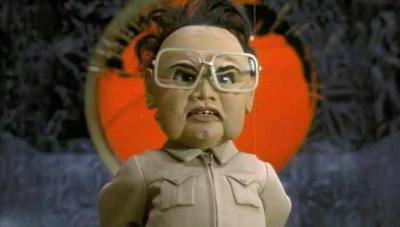Instructions: How To Deal With Countries That Really Have WMD's

US admits problems in persuading North Korea to dump nuclear weapons
Thu Jul 28, 1:12 PM ET
BEIJING (AFP) - The United States admitted that persuading North Korea to abandon its nuclear weapons drive was not proving easy and that key differences remain, but the two sides agreed to meet again.
The main protagonists met face-to-face for the third time since six-nation talks on Pyongyang's nuclear program resumed this week. While the atmosphere and rhetoric is better than previous encounters, neither side is budging from its uncompromising position on the three-year standoff.
"We had a lengthy discussion and I must say there are a number of differences," chief delegate Christopher Hill told reporters after his two-hour meeting with North Korean counterpart Kim Kye-gwan.
"On the other hand, on some points we have some common understanding on how to proceed. I must say, though, this is not an easy process."
The talks, which also include China, South Korea, Russia and Japan, are aiming to produce a joint statement setting out what has been achieved and where they go from here, but this has yet to be drafted.
Hill said he hoped the process could begin within 24 hours.
Unlike the previous three rounds, the latest negotiations have no fixed end-date, although Russia's chief delegate Alexander Alekseev said he planned to leave Beijing on Saturday.
The Russian news agency Interfax reported that Hill proposed to Kim that international inspectors enter North Korea in September to check its nuclear facilities, but Hill denied this.
International Atomic Energy Agency inspectors were thrown out of North Korea in December 2002 after the US accused the regime of running a uranium enrichment program, sparking the current showdown.
"The problem of verification is in my opinion one of the most important problems of the whole process," said Alekseev, who nevertheless said he was more encouraged than discouraged by what he had seen this week.
Host China said it was too early to say whether the negotiations had succeeded or failed, and admitted there were still major hurdles to clear.
"It's far too early to say if there is a breakthrough or a breakdown," said foreign ministry spokesman Qin Gang of the talks between the United States and North Korea.
"There were difficulties but there is a willingness to continue talking. I think they are in the process of finding common ground and there are differences but what the common ground is, I'm not in a position to comment.
"There are many problems that need to be discussed ... and everyone needs to continue talking."
The United States and North Korea are scheduled to meet one-on-one for a fourth time Friday, the US embassy said.
With little sign of movement, a meeting between all of the chief delegates was cancelled to allow the US-North Korean contact to go ahead. It has been rescheduled for Friday afternoon, South Korean officials said.
Pyongyang refuses to disarm until Washington normalizes relations, among other conditions. A key sticking point is the American allegation that North Korea is running a highly enriched uranium program.
On Wednesday, the United States said that North Korea must abandon all its nuclear programs, including uranium enrichment.
North Korea has always denied operating such a program, which can be used to produce atomic explosive devices, either for weapons or for peaceful purposes.
"This issue has to be clarified in the process of the six-party talks," said Qin.
North Korea abandoned the six-way talks in June last year, complaining of hostile US policy, but returned after a 13-month hiatus -- enticed in part by a softer US approach.
In an effort to forge a breakthrough, South Korea has offered to provide the North with 500,000 tonnes of rice and some 2,000 megawatts of electricity if it abandons its nuclear ambitions.
Seoul has also suggested that in the joint communique issued at the end of the talks North Korea pledges to dismantle its nuclear weapons programs. In return, the other nations would promise to normalize ties and offer security guarantees and economic cooperation.
SOURCE - http://news.yahoo.com/news?tmpl=story&u=/afp/20050728/wl_asia_afp/nkoreanucleartalks_050728171246



1 Comments:
ray ban sunglasses
coach outlet
polo ralph lauren
coach outlet online
buffalo bills jerseys
ray ban sunglasses outlet
nike roshe
coach outlet
bills jerseys
hugo boss outlet
Post a Comment
<< Home